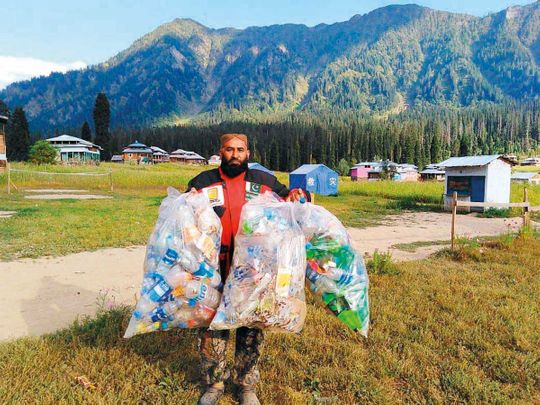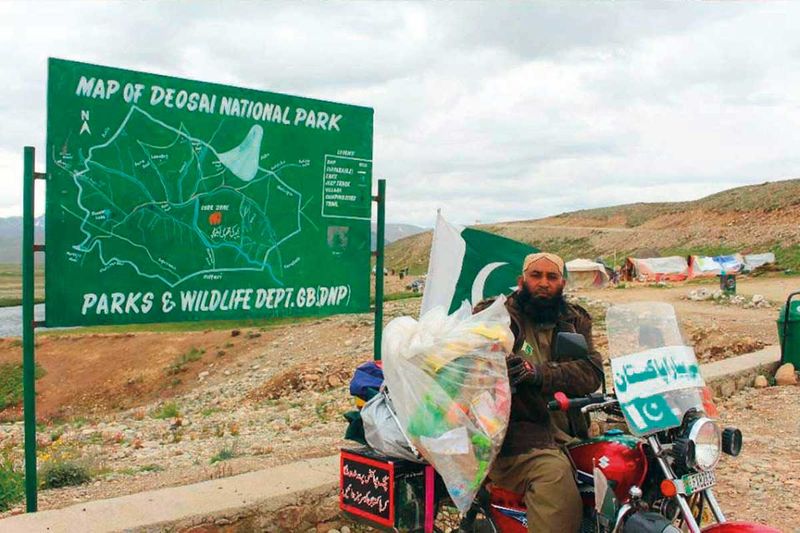
Islamabad: As the man parked his bike outside Islamabad’s iconic Faisal Mosque, the people were fascinated to see a stranger in camouflage trousers and multi-pocket travel vest with Pakistan’s flag and a message reading: “Clean and Green Pakistan.” Saifullah Kashmiri, on a solo mission on bike to make Pakistan clean and green, reached Islamabad on September 17 after cleaning up the valleys and lakes in the northern region. Fortunately, what surprised him was that the area near Faisal Mosque was much cleaner.
Clean and Green Pakistan mission
“During my 2019 Clean and Green Pakistan tour, I aim to cover 12,500 kilometres touching all regions of Pakistan from the highest lakes and mountains to the deserts and coasts in the south” Saifullah, 43, told Gulf News. The 105-day tour, titled ‘Khunjerab to Gwadar’ began in mid-September from the highest paved border at Khunjerab Pass in Gilgit-Baltistan (GB). After covering Khyber-Pakhtunkhwa (KP), Punjab and Sindh, he would finally end the journey at shores of Arabian Sea in the port city of Gwadar in Balochistan. Inspired by the success of 2018 cleanliness tour, he has hit the road again to promote environmental awareness.
Saifullah’s real name is Ghulam Rasool and he hails from Pak Pattan, the city of the great saint in Punjab, but has been residing in border town of Bhimber for the last 18 years.
What compelled him to kick off the journey of thousands of miles without expecting any reward or recognition? “This”, he said, pointing at the green and white flag and the words ‘I love Pakistan’ on his vest. “Pakistan is not just my country but my home. I am doing this for my home and my fellow citizens.”
What inspired him?
It all started two years ago, when he visited his favourite waterfall but was disturbed to find out that the region’s beauty has been marred by piles of garbage due to mass tourism and poor waste management. “At that moment, I thought if no one else is going to do it then I will,” and that was the beginning of his mission to protect the tourist destinations. “I couldn’t rest until I collected all the trash near the waterfall and disposed it off properly.”
His dedication and appreciation on social media gave him strength to continue, as the friends who earlier made fun of his effort are now his comrades in cleanliness mission. He is thankful to his wife, two kids, family and friends for all the support. He also uses social media to educate and spread awareness where his posts have been shared by thousands.
Tourism boom threatening natural beauty
The tourism boom in Pakistan is threatening the country’s most beautiful destinations. With few bins in place and disregard for law and environment, plastic bottles can be seen in the once pristine streams and lakes, leading to severe environmental degradation. “Plastic bottles were the most common item among the trash followed by food wrappers and plastic bags” he shared. To tackle the issue, he suggests that government should involve big companies to set up trash collection centres and introduce bottle deposit schemes at tourist spots.
Saifullah is extremely worried about trash tourism, creating water, air and noise pollution. “It is adding to climate change, which is going to get worse by 2026, which means more droughts, heatwaves and extreme weather. Water is already scarce in Pakistan especially in Balochistan. We must act now,” he implored. His two-word strategy to save the planet is: clean and green.

Planting trees after clean-up activities
On his bike, he reach even the remotest regions to clean tourist spots one city at a time and dispose off the trash in the allocated places. At one point, last year, he had to travel with trash bags on bike for about 85 kilometres until he found a disposal site. His mission does not end at cleaning as he aims to make the tourist areas as green as possible. “Since last year, my friends and I have planted over 35,000 plants all over Pakistan that mostly include fast-growing and fruit trees.” He loves to give away free plants, which according to him is “the best gift.”
Keep it clean, keep it green
Recalling one of the memorable experiences from 2018 tour, he said while cleaning up Deosai National Park — one of the world’s highest plains at 4,000 metres — he noticed some tourists staring at him. “They were looking at me as if I was a man from another planet”, he chuckled. “When I went over to greet them, they said: ‘We are amazed because we have only seen people throwing rubbish and never picking it up’. That made me glad that at least someone was noticing my efforts,” he said.
During his travels, Saifullah found out that Deosai National Park was the cleanest tourist spot in the whole country followed by Bahawalpur in Punjab. The city of Karachi turned out to be most cluttered while in the north, he found the settings of Saiful Malook, mountainous lake in Kaghan Valley, messy.
His message for the people is simple: “Always throw trash in dustbin or bring it back with you. And plant at least two trees in your lifetime to make Pakistan liveable for future generations.”
FAST FACTS
• Saifullah is on a mission to clean major tourist spots in Pakistan
• He is travelling on his bike cleaning one city at a time
• He cleans the area and then disposes off garbage at designated place
• He started journey from 4,600 metre high Khunjerab Pass in Gilgit-Baltistan
• Would end at the shores of Arabian Sea in Gwadar city in Balochistan
• His mission is to promote environmental awareness and help protect the planet
• He is also urging people to conserve water as Pakistan faces water scarcity
• Pakistan uses 55 billion plastic bags every year that causes serious threat in the absence of proper waste management and recycling process.
Cost
The trip is costing him around $1,600 (Dh5,877), a part of which has been sponsored by Rehan School and LS2 helmet company, but it is mostly self-funded. “Any support from the government would mean a lot as I am doing this cleanliness drive solely for my country.”
On Bike
The red-coloured bike Saifullah is driving is a Suzuki GS150, which he says is comfortable for the long journey. “I have just got new tyres and hopefully these will last throughout the 12,500km tour if I safely cover the rough terrain in KP and GB. On his bike, he carries all essential items such as food and water, first aid box, sleeping bag, clothes, gloves and bags for the garbage collection.












